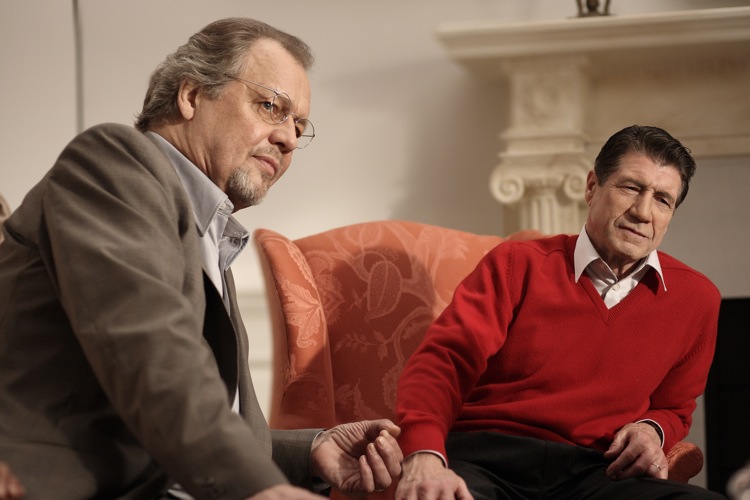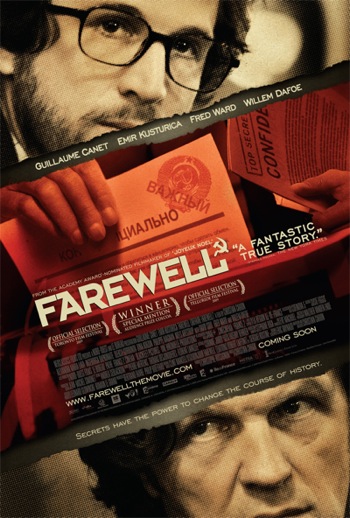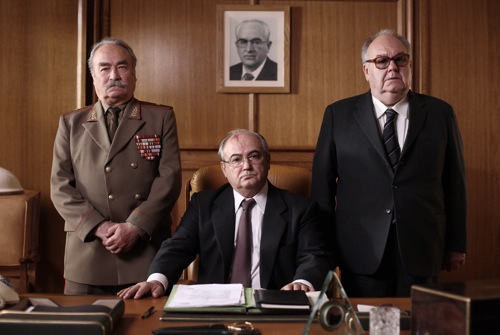
By Joe Bendel. Instead of the man who knew too much, he was the spy who knew everything. Codenamed “Farewell” by the French, Colonel Vladimir Vetrov was charged with reviewing the intelligence the KGB gathered on the free world—every speck of it, including the extent to which each western intelligence agency had been compromised. He also knew the Soviet government had failed to live up to its promises. President Ronald Reagan called the resulting L’Affaire Farewell: “one of the most important espionage cases of the 20th century.” It also inspired Christian Carion’s espionage drama Farewell (trailer below), which opens in Los Angeles and New York this Friday night.
 Like the real-life Vetrov on whom he is based, Colonel Grigoriev was once stationed in Paris, where he rebuffed the advances of the French and American intelligence services. However, by 1981, the Colonel had come to the conclusion the Soviet Union needed drastic reform – so he approached the DST, the French equivalent of the FBI (the only western intelligence agency the KGB had not bothered to infiltrate) through Pierre, a French businessman with no formal involvement in the world of espionage.
Like the real-life Vetrov on whom he is based, Colonel Grigoriev was once stationed in Paris, where he rebuffed the advances of the French and American intelligence services. However, by 1981, the Colonel had come to the conclusion the Soviet Union needed drastic reform – so he approached the DST, the French equivalent of the FBI (the only western intelligence agency the KGB had not bothered to infiltrate) through Pierre, a French businessman with no formal involvement in the world of espionage.
Out of his element, Pierre wants to extricate himself from the affair as soon as possible, but Grigoriev insists on dealing only with him, considering the professionals untrustworthy. Partly in recognition of the value of Grigoriev’s intel and partly out of a sense of budding friendship, Pierre becomes the Colonel’s amateur handler, passing a wealth of information on to the DST.
While Pierre and Grigoriev meet in parks and train stations, another alliance in being forged between President Reagan and Mitterrand, France’s newly elected socialist prime minister. The President is less than thrilled at the prospect of Communist ministers in the new French cabinet, but Mitterrand has an olive branch to offer: “Farewell.”
Farewell’s portrayal of these influential world leaders is quite fascinating and surprisingly even-handed. Philippe Magnan’s Mitterrand is intelligent but aloof, coming across like more than a bit of a cold fish. Refreshingly, Pres. Reagan is not depicted as a doddering bumbler, but as an engaged and commanding leader. Yes, there are scenes of Reagan using classic film as a metaphor with his National Security Advisor (played by an almost unrecognizable David Soul), but never in way that calls his judgment into question.
Yet, there is something about Reagan’s distinct mannerisms that are hard to emulate without lapsing into caricature. American actor Fred Ward takes a good shot, but he still sounds more like a Saturday Night Live impersonation than a real flesh and blood individual. Frankly, Ronald Reagan remains such a commanding presence in the national consciousness it makes any dramatic representation problematic.

Fortunately, Farewell’s primary leads are uniformly excellent. Though he looks appropriately rumpled, Emir Kusturica plays Grigoriev sharp as a tack, keenly aware of his own personal contradictions. As Pierre, Guillaume Canet’s performance is also smart and understated, avoiding the headshaking “what-did-I-get-myself-into” histrionics. As a result, viewers believe the unqualified trust Grigoriev places in him.
Technically well produced, cinematographer Walther Vanden Ende and designer Jean-Michel Simonet effectively capture the oppressive drabness of the Brezhnev era. Yet ideologically, Farewell resists easy classification. While it certainly conveys the repressive and corrupt nature of Soviet Communism, the film sometimes suggests a John Le Carre-like equivalency, at least between the rival spy masters. However, the shrewd conclusion again challenges the audience’s conceptions of faith and loyalty, within the context of the preceding “L’Affaire Farewell.”
Considering how long it has been since a brainy spy film sneaked into theaters, Farewell is quite welcome indeed. Featuring two compelling lead performances and a meaty story that intrigues on several levels, it is an engrossing film. It also might be the fairest shake Pres. Reagan has gotten on screen since his inauguration in 1981, ironically coming by way of France. Definitely recommended, Farewell opens Friday (7/23) in both Los Angeles and New York, expanding to other cities the following week.
Posted on July 20th, 2010 at 9:13am.
Thanks for the review Joe. I was wondering what the film’s take on President Reagan would be. Well, at least he isn’t depicted as a caricature and the Soviets are still basically the villains. That’s rare enough nowadays.
Good review.
I’m happy to see that this film is coming to a theater close to me — I can’t wait to see it.
I’m very interested in seeing this too. This looks like it may be intelligent and well done.
I love that indie film is heading into more of a direction like this. This film looks cool, and yet has all the right values. I’m starting to feel a lot better about the movies. All I ever asked is that if we’re going to get endless left-wing films thrown at us, that there be a few right of center or at least centrist films with normal values in them to provide some balance. I am definitely going to try and see this.
I will check this out when it hits my area. I still have fond memories of Fred Ward as Remo Williams.
Yes, he was good in that.
The trailer looks good. IT’s good to see David Soul back in something. But what really takes me back is seeing that splotch on Gorbo’s head.
Yes, it chokes me up, too.
way to go, French … it looks like they got Reagan’s sweater right.
Yes, and that’s important for context.